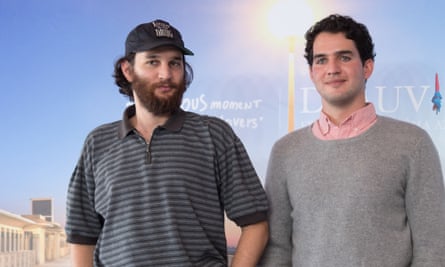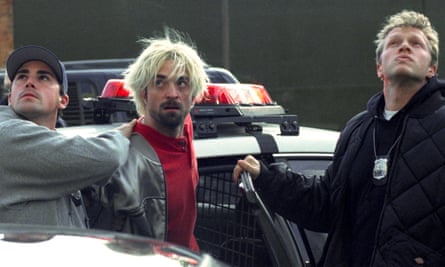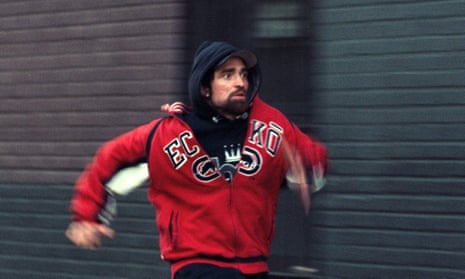In a Hollywood that seems more monetised, sanitised and purely profit-driven than ever – these days, we use the phrase “film industry” so much more than “film world” – it is good to be reminded of the people tearing up around the edges, propelled by their own outsized forces of personality and vision. Josh and Benny Safdie are chancers, hustlers and prodigious talents. You could say they have been film-makers since they were kids, when their dad used to shut them in a closet with a camcorder. They are also throwbacks to a more haphazard, chaotic and readily romanticised time when movies trailed the mythos of their own making; when what you saw on screen in the 70s, say, was tinted with behind-the-scenes legends of chutzpah.
The brothers, who are in their 30s and grew up in New York, shuttling between Queens and Manhattan, are known for low-budget, “gutter realism” movies and for opting for nonprofessional actors through the process of “street casting”. Those who know them say they have a special kind of magnetism for madness. The film-maker Ron Bronstein, a frequent collaborator, has said that Josh, in particular, “can’t move five inches through life without attracting a lunatic experience”. Such as, for example, that time at the height of Twilight hysteria when Robert Pattinson sent them an out-the-blue email, begging them to let him work on whatever their next project was. They could not believe he had even seen their low-budget heroin drama, 2014’s Heaven Knows What. The extra layer of oddness to this story is that Pattinson hadn’t seen the film: he was going purely on some sixth-sense reaction he had to a still of its star Arielle Holmes’s pink-lit face.
That email catalysed one of the most unforgettable movies of 2017. Good Time, the Safdies’ third feature film, takes place over one messed-up-beyond-all-imagining night in a neon-bled Queens as budding career criminal Connie (Pattinson), fresh out of prison, attempts both a bank robbery and a jailbreak after his brother, who has learning disabilities, is imprisoned in New York’s Rikers Island. Brutal, hyper-adrenalised and unrelentingly headlong, the movie thrums with diabolical energy, propelled by a blistering 80s-tinged score by the electronic musician Oneohtrix Point Never.
“Don’t listen to it when you’re driving,” Josh warns, handing me a record of the soundtrack. “Someone got a speeding ticket. They got pulled over and [the cop] was, ‘Like, what happened?’ ‘I was listening to the Good Time soundtrack.’”
We are in their small but maximised – “Tokyoed out”, in their description – Manhattan office, a space filled with movie posters and shelves of DVDs. Benny, 31, the clean-cut younger brother, is in pressed chinos and a striped, button-down shirt, with the flash of a gold wedding ring on his finger. Thirty-three-year-old Josh – bearded, wild of hair and exuding a feral air – is wearing a Connecticut state prison T-shirt. Neither takes offence when I ask if it is stolen. In fact, it was a gift from a guy who befriended Josh while he was hanging around Manhattan’s criminal court. When Josh asked why this guy’s nickname was “the Comish” he learned he was talking to the former commissioner of Connecticut prisons, Jim Dzurenda. “So he’s a very sweet guy and he’s like: ‘Look, I’m not on the job any more, I actually want to get into entertainment. Can you put me in the movie?’ And I’m, like: ‘Jim, I’m dying to put you in the movie.’ So he’s in the movie! He’s the guy Macing Nick in Rikers Island.”
Why is it, I begin, that they are so drawn to – and Josh, fidgety on his chair, rushes to finishes the sentence – “… winners who can’t win? Because they’re all winners, in my opinion; they’re all heroic. Connie is a very heroic person, in that he’s not willing to accept his situation. [He] does a lot of despicable things in the movie, but he is doing it in the name of a dream, a vision, a purpose.”

Josh shrugs off the suggestion that the Pattinson email story has already entered legend. “It doesn’t even seem that legendary because … you know why? I don’t mean to say this disparagingly to him, but, the whole Twilight thing? It’s not even close to my periphery. Like, when it was happening, I kind of remember people talking about it. But not even really. To me, he was just an interesting guy who was chasing interesting work. It was just an email, you know?” He concedes: “But I knew he was a megastar, I knew that.”
They were flattered, then, but neither of them seemed to have felt much urgency to respond. They were chasing another film, their forthcoming Uncut Gems, which Pattinson wasn’t right for.
“We were so single-track-minded at that moment,” says Josh, “‘What do we do here?’ And our producers were like: ‘You write back!’”
As Benny says of Pattinson: “He wanted people to look at him in the movie as if he had been street cast. He wanted to disappear.” He succeeded. For the first few minutes of the movie, I wondered who this electrifying young guy was on screen. At the time of filming, Pattinson had worked out elaborate systems of avoiding paparazzi involving rental cars. He transmutes that hounded terror into Connie, with a naked mania in his eyes as he plots each desperate move, driven by a barbarian love for his brother.
Played by Benny himself, Nick both opens and closes the movie in scenes that bookend the film’s gritty tone with moments of tenderness. At first, the brothers wanted to cast a disabled actor. “We interviewed really great people,” says Benny. But the demands of the movie in both its action sequences and the way in which the character needs to cry, presented an ethical dilemma: “Getting people to do that who had a disability, we would have had to push them in ways that would have made us feel uncomfortable.” It was important for him, he says, “to not condescend in that part. I’m not going to play down to Nick. Nick knows what he wants and that’s it.”

The critical response has been largely one of acclaim; the film received a six-minute standing ovation at Cannes. The few dissenting voices, however, have taken issue with the film’s depiction of race. The New York Times wondered if the many racial signifiers – Connie and Nick disguise themselves in latex masks that make them look like African American men, for example – were a form of “trolling, a coy, self-disavowing provocation”. One trenchant, nastily credible scene takes place in an amusement park where Connie plans his escape based on the correct assumption that the two white police officers will arrest the two black people on the scene, and not him. As Josh says: “As writers, we were thinking how can he get out of this scenario, this is a very tough scenario. And then, when we realised how he can get out, we’re like, oh my God, society is so fucked up that this could work. I think that is the microcosm of the movie’s macrocosm, which is that white people can get away with a lot more [than black people]. And people of colour are often the victims of white manipulation. I showed that scene to friends and they were like, ‘Whoa, it’s crazy that the cops arrested the people of colour.’ And I’m like, ‘Isn’t it?’”
He adds: “If you make the white-elephant films that are loudly about something, then people walk in with a certain agenda. But if you make a movie that’s considered garbage – like a crime film – you’re playing with a more interesting space because it’s considered disposable. It’s like tricking a kid into eating cereal: you put a cartoon on the cover of the box, but it’s filled with a bunch of vitamins.”
Josh describes Connie as “always pushing the story forward; he can’t stop”. He seems to understand that kind of compulsion, or at least propulsion, first-hand. The first time he was arrested he was 15, “and it was … stupid”. He doesn’t care to elaborate, except to say, “it’s always stupid” and “most of the people in the penal system, they’re victims. I mean, there are some bad people who need to be punished and rehabilitated, but there’s no rehabilitation in America.”
“When Josh gets pulled over, it’s game over,” Benny says. “I remember once we were doing press in California and we got pulled over for speeding and …” he turns to his brother, “you must have really got the guy angry because he gave you two tickets, but only told you about one. So there was a warrant out for your arrest in California!”
Benny is laughing, but Josh doesn’t seem to recall the incident with the same fondness. “I’m so, so petrified of stasis,” he says. “I’m so petrified of time and being reminded of time.” (He doesn’t wear a watch for this reason.) “I like to just keep moving forwards because if you’re moving forwards you can’t stop, and then, once you stop, you get depressed. That’s it for me.”
The brothers, Cannes regulars, now have an acclaimed film that represents a career gamechanger for a global heart-throb. In other words, they’re not going to struggle to finance their next project. Josh, however, puts it like this: “We can have $20m to make a film, but we’re still going to approach it like we have 40 bucks because that’s how we’re wired to make something and I don’t think that will ever change.”
They will continue to work by the maxim of “seek forgiveness, not permission”. Benny offers an example: “You get [police] permission [to film] on one block and you take the five blocks around it.” At one point during filming, they looked over and saw that their location manager had, “a whole box of cigars and he and all the cops are smoking cigars”. Benny laughs. “He knows how to work it.” Takes two to know one.
Good Time is in UK cinemas from Friday 17 November

Comments (…)
Sign in or create your Guardian account to join the discussion